Contents
Despite the endurance of most varieties and hybrids of potatoes, their unpretentiousness, plants need care during the season. Irrigation also belongs to the basic agrotechnical measures – if the garden bed turns into a “desert”, it is impossible to collect a good crop of high-quality tubers. It is logical that the need for water increases with increasing temperature and lack of precipitation, so it is necessary to water the potatoes in the heat, otherwise the development of the aerial part and the growth of tubers practically stops.
Is it possible to water potatoes in hot weather
If the heat (30-35 ° C and above) is complemented by frequent and heavy rains, the potato may well get by with natural precipitation. But short showers for horticultural crops are practically useless and cannot replace watering. Water evaporates very quickly, not having time to wet the substrate to a depth at which it can be “sucked” by the roots.
When the heat on the street is complemented by a long “drought” (two weeks or more), watering the potatoes is vital. Otherwise, you can not count on a good harvest, its “presentation” and outstanding taste. This condition applies to the entire period of active vegetation, including watering potatoes in the heat immediately after planting.
At the later stages of the development of bushes in such an “extreme situation”, the growth of existing tubers stops, but the active formation of “secondary”, very small ones begins – by the time of harvesting, their diameter varies from 8-10 mm to 2-3 cm. For long-term storage and cleaning such they are unsuitable.
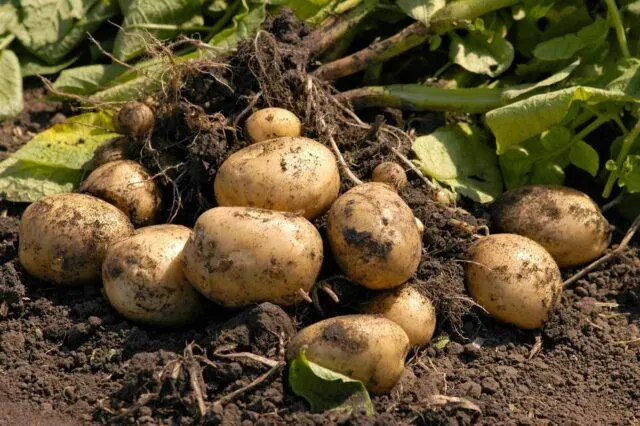
Neglecting watering potatoes in the heat, you can not count on a good harvest
The need for another watering of potatoes in the open field in the heat is quite eloquently evidenced by the appearance and condition of the bushes:
- stop growth and development;
- drooping, losing tone, soft to the touch stems;
- sagging “rags”, thinned leaves;
- the color of the leaf plates, changing to pale green or yellowish green;
- drying, blackening and dying tips of the leaves, the smallest and thinnest stems.
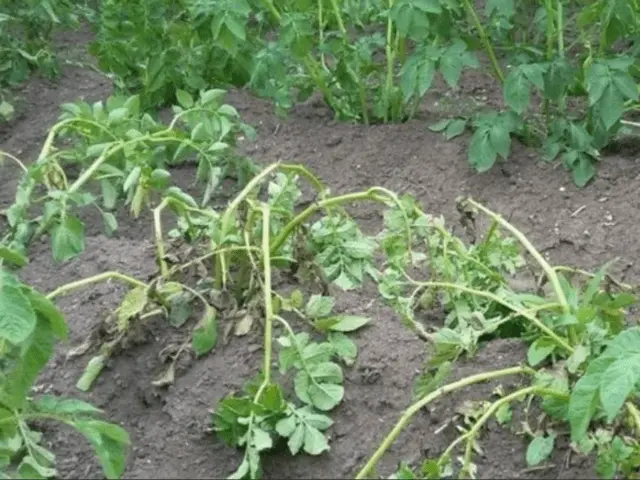
To understand that the bushes “suffer from thirst”, just look at them
You can also focus on the condition of the soil. Potatoes in the heat need another watering if the substrate crumbles at a depth of 5-6 cm when trying to squeeze it into a handful. The soil, caked into a thick cracking “crust”, testifies to a critical water shortage.
Not knowing how to water potatoes in a drought, well-meaning gardeners often turn the beds into a “swamp”. However, you should not be overly zealous (both in the heat and in fairly cool weather). In waterlogged soil, the risk of developing fungal infections increases significantly, primarily, which are extremely dangerous for tubers of various types of rot and late blight.
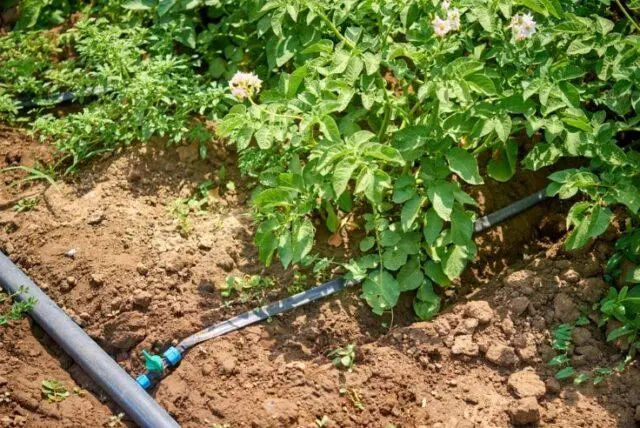
During flowering, the bushes are not watered, but after it – be sure
Do I need to water the potatoes after flowering in the heat
It is necessary to moisten the soil on the beds with potatoes after flowering in the heat, otherwise the yield will decrease by at least a third. The first watering is carried out 4-5 days after the buds wither, it should be especially plentiful – up to 20 liters of water per plant.
Further, if the heat does not subside, watering the potatoes is carried out, focusing on the air temperature, the frequency and intensity of natural precipitation. During the season, in beds with early and ultra-early varieties and hybrids, their number after flowering can reach up to 3-4 times, with medium-late and late – up to 5-6. The approximate rate of water consumption is 8-10 liters.
However, 2,5-3 weeks before the expected harvest, watering the potatoes is turned, even if it is hot outside. Otherwise, the tubers become “watery”. Because of this, their keeping quality is noticeably reduced, and the risk of developing diseases during storage increases. Taste and nutrition suffer at the same time.
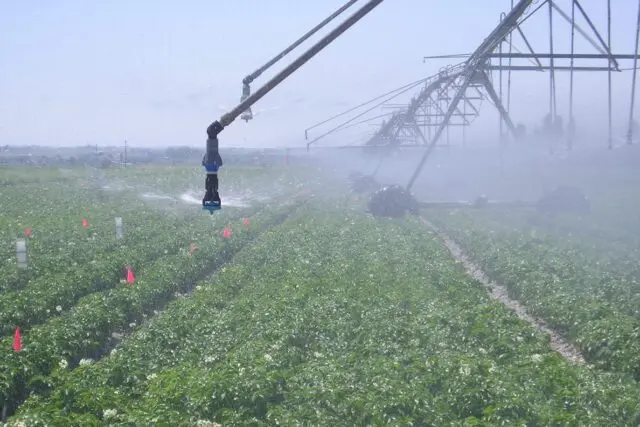
Stopping watering, you can focus on the tops that are almost completely yellowing and lying on the bed.
When to Water Potatoes in a Dry Summer
When a high temperature is established for a long time, combined with a lack of precipitation, potatoes should not be watered during the hottest time of the day. On the contrary, it even harms potatoes. The substrate in the garden quickly sinters into an airtight crust. With oxygen deficiency, the development of tubers greatly slows down or practically stops. And with increasing soil density, the number of potatoes of varying degrees of deformation increases. They are inconvenient to clean, they are not suitable for long-term storage.
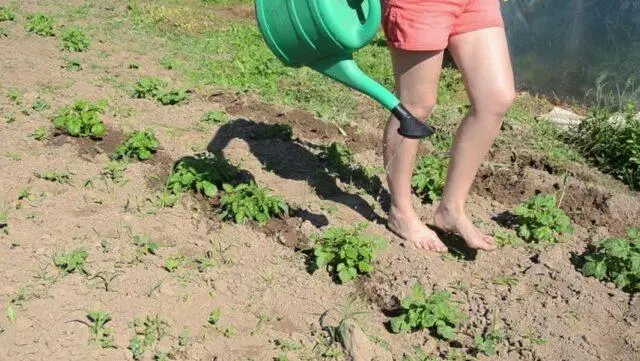
Regardless of the volume, under the hot sun, the consumed water evaporates very quickly
In addition, watering potatoes in the very heat can cause burns on the leaves – areas of dried yellow-brown tissues. The drops of water remaining on the surface of the leaf plates turn into a kind of analogue of lenses – the sun’s rays are focused and “burn out” the tissues under them. This happens especially often when watering is carried out in the morning.
In order for the procedure to benefit the potatoes, it is necessary to moisten the soil in the evening, when the sun is already setting. After about half an hour, it is advisable to loosen the soil in the garden bed in order to improve air exchange and ensure that water “leaks” into the deeper layers of the soil.
How to water potatoes in hot weather
In the heat, when you need to water the potatoes often, in small beds and household plots, gardeners mainly practice watering along the furrows or each bush under the root “individually”. On large areas, such methods are impractical because of the time and effort involved. Therefore, for example, when growing on an industrial scale, various mechanized irrigation systems are used.
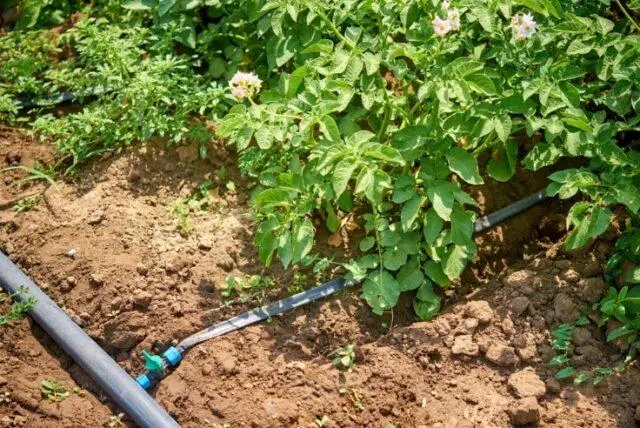
It is desirable that large drops of water do not fall on plants.
Cold water is not suitable for watering potatoes in the heat. The optimum temperature is 23-25 ° C. Tap water is not used directly from the tap – first it is defended or softened in some other way. It is “enriched” with chlorine and fluorine compounds, to which the potato reacts very negatively in the soil.
How often do you need to water potatoes in the heat
Proper watering of potatoes in hot weather in the absence of precipitation is limited once every 7-8 days. At extremely high temperatures (from 35 ° C), the intervals are reduced to 3-4 days. It is impossible to accurately indicate the frequency, in addition to the heat outside, the frequency and intensity of precipitation, it depends on many factors, primarily on the type of soil.
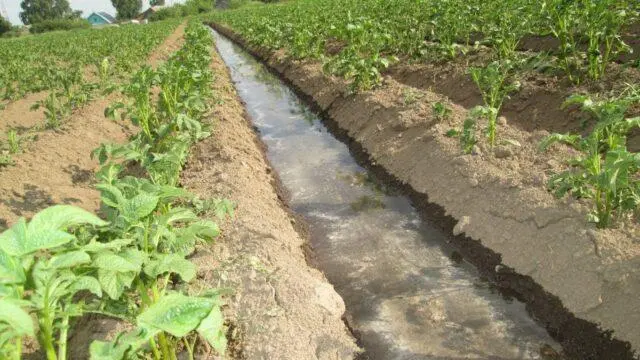
Loose “light” soil retains water much worse than “heavy” clay or peat
The method of watering also matters. Drip allows you to most evenly and deeply wet the soil with minimal water consumption. And when growing potatoes on an industrial scale in the heat, they often resort to creating a “suspension” of the smallest droplets of water over the beds.
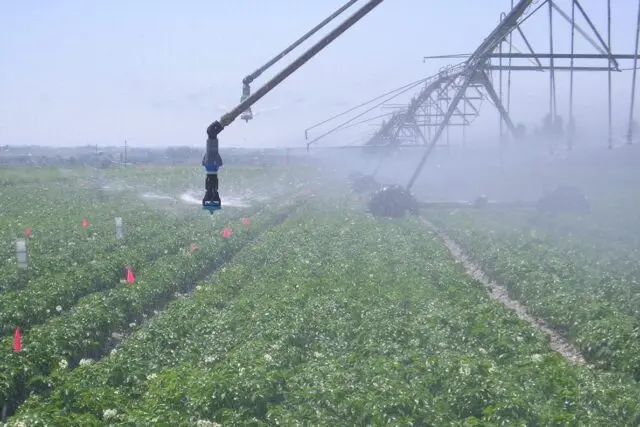
Increased air humidity allows less frequent watering of plantings
Conclusion
Watering potatoes in the heat is not only possible, but necessary. Otherwise, a long “drought” will inevitably have a negative impact on the volume and quality of the crop. However, it must be borne in mind that at different stages of development, plants change their moisture needs. Accordingly, during the season, water consumption rates and intervals between watering potatoes in the heat differ markedly.









